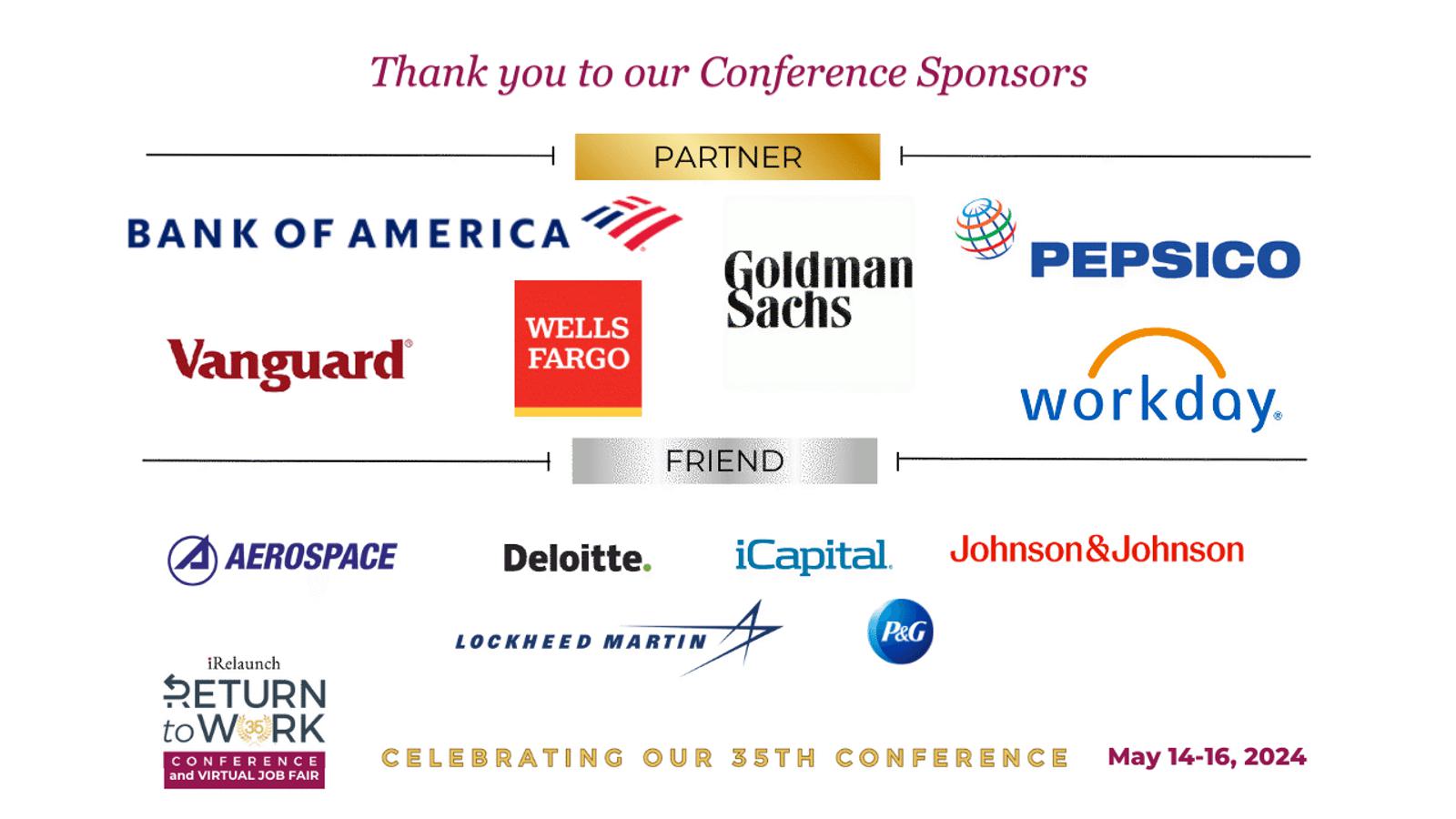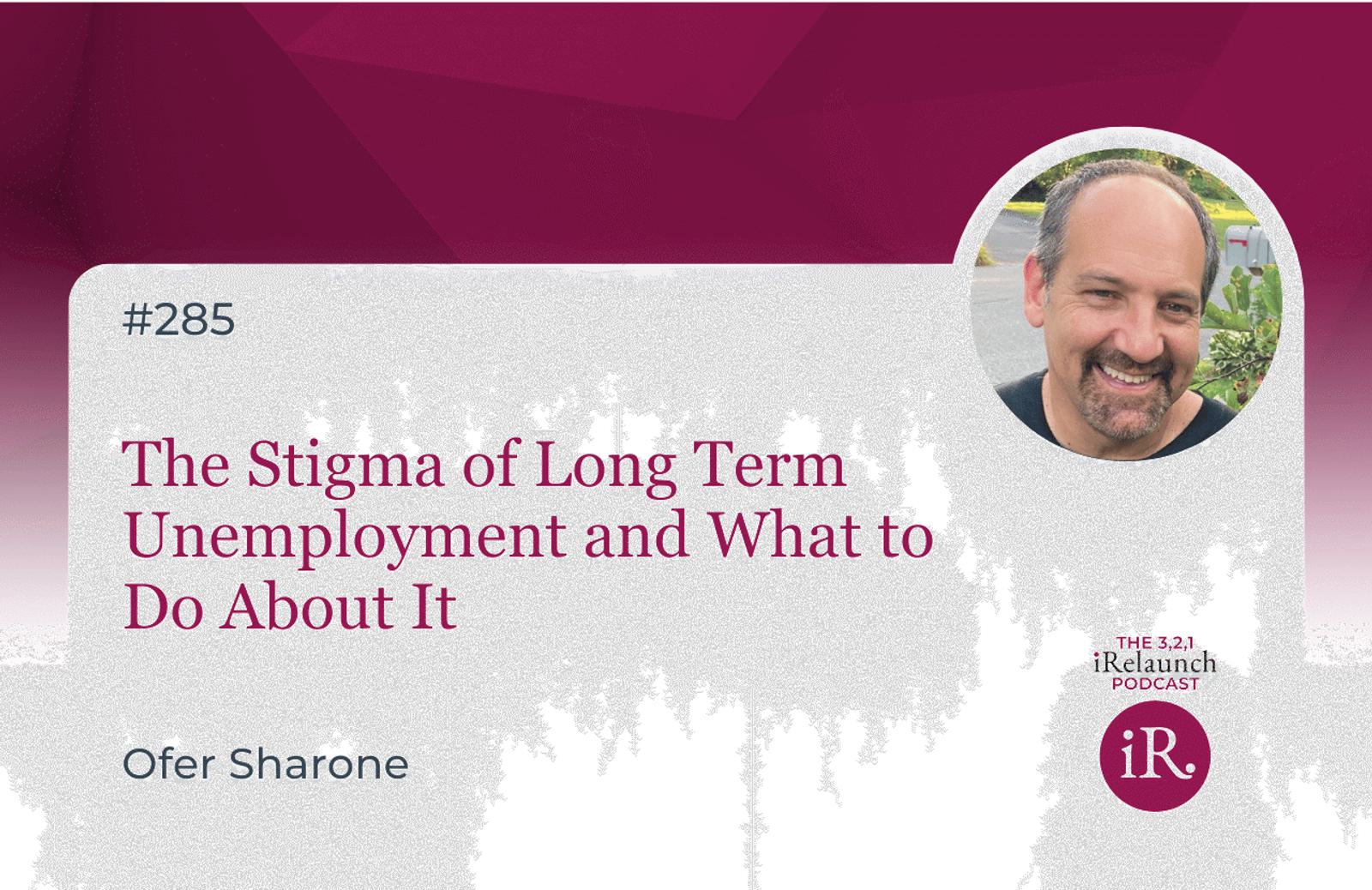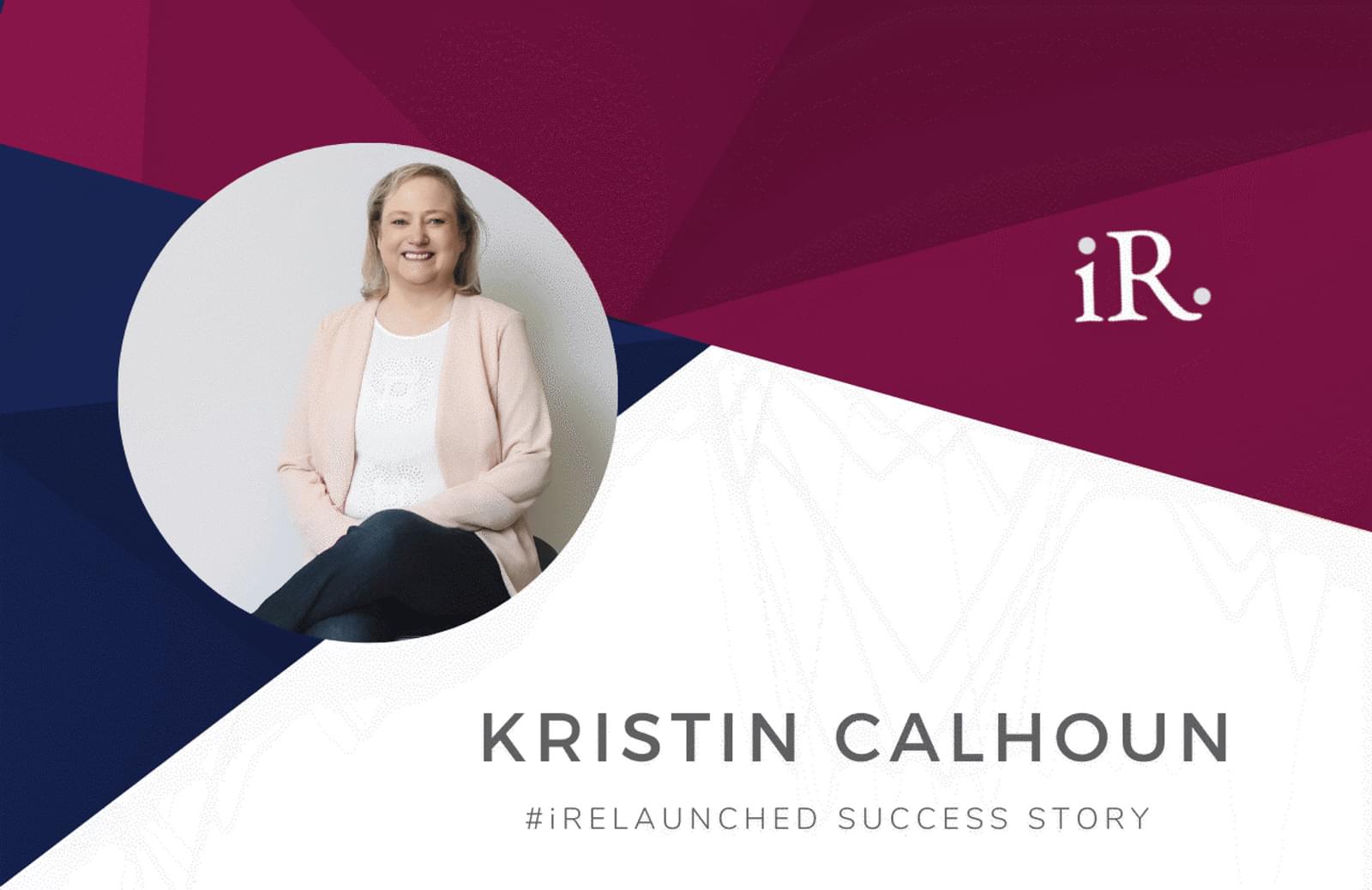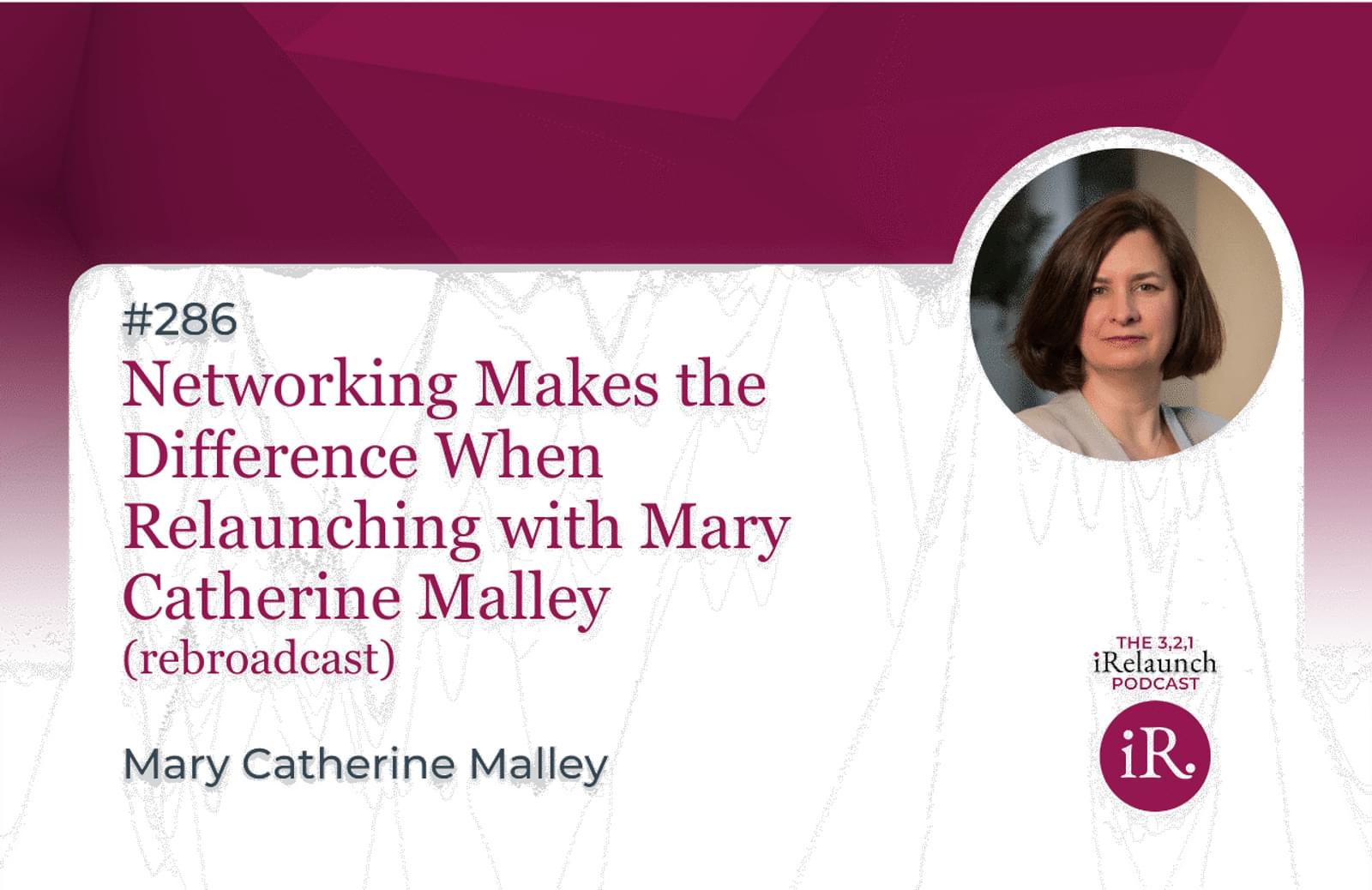
Episode 208: From Part Time Relaunch to Alumni Relations Associate Director, with Maria D’Agostino Crawford
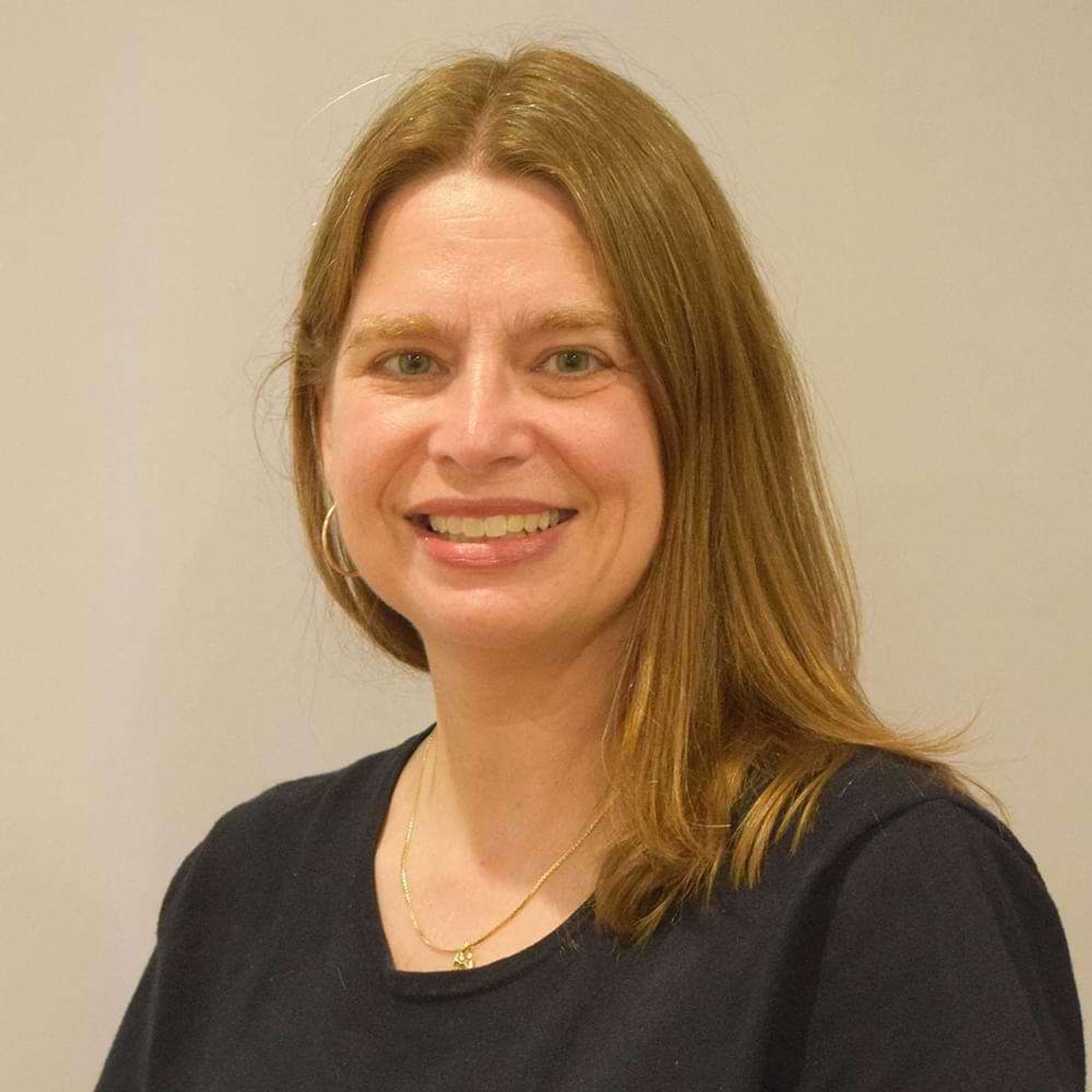
Episode Description
Maria D’Agostino Crawford is the Associate Director of Alumni Relations at Springfield College in Springfield, Massachusetts who took an eight-year career break to care for her two daughters. Maria’s relaunch happened in a series of steps that first involved part time work and then a full time relaunch back at her pre-career break employer in a lower position than when she left. Since then, she has worked her way up to the Associate Director role. Maria discusses her part time to full time approach to relaunching and her career progression to where she is today. She also explains the benefits of intentionally taking a lower-level position when transitioning to a full-time role.
Read Transcript
Carol Fishman Cohen: Welcome to 3,2,1 iRelaunch, the podcast where we discuss return to work strategies, advice, and success stories. I'm Carol Fishman Cohen, CEO and co-founder of iRelaunch and your host. Today, we welcome Maria D'Agostino Crawford. Maria is the Associate Director of Alumni Relations at Springfield College in Springfield, Massachusetts, where she received her bachelor's degree.
She also has an MBA from UMass Amherst and Maria worked for the American Hockey League for several years, and Springfield College for almost two years before taking an eight year career break to care for her two daughters. Maria's relaunch happened in a series of steps that first involved part-time work and then a full-time relaunch back at her pre-career break employer. Ten years after leaving the Springfield College position, she was hired back there as a full-time administrative assistant. And since then she's worked her way up to the associate director role. We will talk with Maria about her part-time to full-time approach to relaunching and her career progression to where she is today.
Maria, welcome to 3,2,1 iRelaunch.
Maria Crawford: Carol, thank you so much for having me today. It's such a pleasure to be a guest on your show.
Carol Fishman Cohen: Well, it's wonderful for us to have the opportunity to speak with you and really get into the details of a relaunch that I think is so realistic for so many of our audience members. But before we get into those details, can you start by describing your career path leading up to your career break and what led to your career break?
Maria Crawford: Sure. So I was fortunate enough when I was in college here at Springfield, I was a sport management major. And my senior year I had a little extra time in my schedule, so I had gone to our career center. And I had an opportunity to interview for a marketing position with a company in Springfield.
In the meantime, before I actually went for the interview, Kay, the woman I was working with, had received a call from the American Hockey League and they were looking for an intern for about 20 hours a week. I had been in connection with Kay since my sophomore year working on resumes and the basic career center type tasks that you do as an undergrad. She knew I was a sport management major. So she called me and said, "Maria, I think you might be interested in this." So I called and I went for the interview and was fortunate to land the position. So I worked for the American Hockey League all of my senior year. In addition to that was my work study job, but I would go to the American Hockey League in the morning, and then in the afternoons, I interned at the Basketball Hall of Fame in Springfield. So it was a very fun senior year. But for those that are interested in sport management, I would really advise you to get as many practical experiences as you can in the field. Because again, it's often who you know, and those connections that you make along the way.
So in the spring of my senior year, I was very fortunate in that the American Hockey League was looking to hire a marketing assistant. And for those of you who may not be familiar with the American Hockey League, it is a league right now that has about 30 teams. They are what would be the equivalent of AAA in baseball. In other words, the top minor league development league for the National Hockey League. So you could have a player playing tonight in Providence with the Bruins, and on Saturday could be recalled and be playing with the Boston Bruins, just to give folks a sense of what the American Hockey League is all about.
We had very close ties with the National Hockey League. So anyway, and for me, the funny thing is hockey was the one sport I really did not know a lot about. I never played hockey, but I quickly learned a lot about it. And again, you go where the opportunities are. So spring of my senior year, I was again fortunate.
They offered me a job. So I started full time two weeks after graduating from Springfield College. And I was there for about eight and a half years in a wide variety of positions from marketing assistant to interim marketing director of public relations. And my last position was manager of marketing services, which entailed executing the sponsorships that our vice-president sold. So in other words, one good example would be we had a partnership with, Icebreakers gum at the time was just coming out. And my immediate boss signed the sponsorship with Nabisco and it was my job to make sure that all of our teams got 10,000 pieces of gum for their giveaway Saturday night or whatever it might be.
So I was more of the execution person of the sale. So in the meantime, I continued to volunteer and keep connected with Springfield College because I just always loved Springfield College, it's a very special place for those that have come here. We have a very special philosophy. It's called the humanics philosophy, which has been going strong since 1885.
And basically it's educating students for leadership and service to others in spirit, mind, and body. The triangle is our key logo. If you ask, any Springfield College alumni can tell you about the triangle and what it signifies. I've always had a strong feel for Springfield College. So in the meantime, I volunteered on my reunion committee. I had volunteered to drive a golf cart at reunion, volunteered with our career center, always kept in touch and always thought, you know, this would be a really nice place at some point in my life to work. I knew after a couple of years in hockey that I really didn't envision myself there forever. It was a great experience.
But at the end of it, I had just gotten married and I was thinking of starting a family, so I was looking for other opportunities. So in 1999, there was an opportunity that arose at Springfield College. And I interviewed for a position and interesting enough, I didn't get the position I interviewed for, but was offered another position, which was the assistant director position.
So again, I tell folks, “Don't doubt yourself. Just go in.” "You gotta be in it to win it" as they say. Right? So in February of 1999, I accepted a position at Springfield College as the assistant alumni director. I worked at Springfield College right up until shortly before I gave birth to my first daughter.
And at the time that was in September of 2000. I think this is a common theme with many women as you're going through that time in your life. You're thinking, "Can I go back full time? Can I handle being a full-time mom with a newborn?" It was a first time experience for me. And the more I thought about it, the more I realized that I really needed to, for myself, stay home with my daughter.
I just felt that the role at the alumni relations office at the time was definitely a 40 plus hour a week job. We were obviously doing a lot of events and programs when a lot of other people are off, so nights and weekends. And it just would be too much. If it was a position that was more of a 35 to 40 hour a week position, I probably would have thought more seriously about coming back. But I just knew that deep down, I just knew I couldn't handle that. So I resigned and was home with my daughter, Amy, and then two years later, my daughter, Megan came along and that led to an eight year career break.
Carol Fishman Cohen: It's always longer than we think it's going to be.
Maria Crawford: Yes, amazing how fast those years go.
Carol Fishman Cohen: Yeah, absolutely. When did you get your MBA?
Maria Crawford: So I received my MBA in 1995. And at the time I was working full time at the American Hockey League. Again, I always had an interest in business and I felt that it would be a wonderful degree to have as a backup, if at some point in my life I decided I no longer wanted to work in professional sports.
And at the time UMass offered a wonderful program. And this is before online classes were even really a thing. But they offered what they called their professional MBA program at Holyoke Community College. It was a part-time program. So one of the qualifications to be accepted into the program was that you had to be working full time.
We had the UMass professors, and the location was a little closer than having to go up to UMass Amherst from Springfield. So it was part-time, I was very busy. I'm glad I did it when I did. I used to joke that I could be found in one of five places, either at the American Hockey League office, in class, at the library, at a hockey game, or asleep. That was basically my life for about four years.
Carol Fishman Cohen: Oh, wow. That's great. You know, I thought that UMass Amherst has an MBA program that is specifically in sports management, but maybe that came later.
Maria Crawford: Right now the sport management program is part of the Isenberg School of Business. So I think that's relatively newer. I don't think that was the case back in the early nineties, but I'm not a hundred percent positive on that.
Carol Fishman Cohen: Interesting. So you had mentioned to us when we were talking earlier that in the last year of your career break, at which time you probably didn't even know it was the last year of your career break, you took a tax preparation course. And hearing about your background now, I want to know what made you sign up for that and what happened after that?
Maria Crawford: So I always have had an interest in accounting and taxes, and I think that goes back to, I had an amazing teacher in high school for a college accounting course who exposed us to doing tax returns and accounting.
It just always clicked with me. I saw an ad in the newspaper back then when job postings were still in the newspaper. It was for a free course, all you had to do was pay for the books. So I called and I got more information and I signed up for the class. I think it was Tuesday and Thursday evenings.
And at the time it worked out wonderfully because one of my nephews was actually a college student in the area. So he would come over and babysit my daughters. And they still say he is one of their favorite babysitters. Yeah, so I took the course. It was in the fall of 2007. And then at the completion of the course, I was offered an opportunity to work part-time as a tax preparer for Liberty Tax Service.
Carol Fishman Cohen: I see. Okay. So that's how you ended up going into a tax preparation role. It was a result of taking that course and then, I know that you had mentioned later, you were also working in a part-time accounting job. Can you tell us a little bit more about your thinking and having then two part-time jobs, and how did you get the second one? And were you intentionally seeking this out or was that another one that kind of just happened?
Maria Crawford: Sure. So the accounting position, or excuse me, so the tax position was obviously just during tax season. So from basically January through April. And then it was the following summer, again, I was perusing the want ads in the newspaper, and I happened to see an ad for a part-time position for an accounts receivable clerk at a MassMutual Children's House, which basically is a childcare center for MassMutual, which is a large insurance company in Springfield. So I applied, went for an interview, and at first I did not get the position. The person they hired did not work out. And so, probably two or three months after the interview, the woman I interviewed with called me back and said, "The first person didn't work out." Was I still interested? And I said, "Absolutely." And I knew I could do the job on paper. I didn't have a lot of experience in accounts receivable other than my tax job, which was a little different, but I knew if somebody taught me what I needed to do, I could do it. So I was there for about two years doing the accounts receivable, making sure everybody who needed to pay their tuition, paid.
And then once a month we had to fill out a special spreadsheet for MassMutual. They subsidized the childcare expenses for their employees. So that was once a month, I would do that. And then at that time, again, I happened to see a want ad for a financial aid position at another college here in western Mass. And it was, I think, about a 19 hour a week position. So I said, let me throw my resume out there and see what happens. So in the meantime, I had called my former boss at the alumni office here at Springfield College, Tammie Kidess Lucey, and asked if I could use her as a reference. And she said, "Oh, of course, but I also want you to know there's an administrative assistant position opening up, if you would like to come back."
I said, "Wow"! So I actually interviewed for the financial aid position at the other college. And they never said yes, but they never said no. It was kind of dragging on, and they were interviewing a good number of their folks. So the position that Springfield College then became available and I applied. And since I really had never heard from the other school, and I always loved Springfield College, I decided to take that position. At that time my girls were a little older, so I felt that going in as an administrative assistant would not be quite as long in terms of the hours and the commitment and the responsibility as an assistant director position, which I had left. And that it would be a good way to reenter full time while my girls were still in elementary school.
Carol Fishman Cohen: All right. So I want to underscore what you're saying right now, to our audience, who are relaunchers and if there are any employers in the audience, because I actually wrote an article about this for Harvard Business Review, about why people sometimes intentionally take a lower level job than they left, and you are giving a perfect illustration of it.
You had a much higher level role, and you were doing these interim part-time roles, but you decided intentionally to take this administrative assistant role because you thought it would dovetail nicely with where you were in your life stage and where your kids were. And that's really important for relaunchers and employers to understand. Sometimes we in the interview might need to educate the employer to say, "Yeah, I know I might seem overqualified for this role, but this is really why it's perfect for me right now at this life stage." So it sounds like that was your mindset going in.
And so how did that evolve? You were in this administrative assistant role, and did it work out the way you wanted to initially? It was not too high stress, or maybe it was, but it had the hours that you wanted to have. Did it play out the way you thought it would?
Maria Crawford: I think in the back of my mind, Carol, I always envisioned myself hopefully at some point moving up to where I was when I had left previously. And so as things would have it, I was in the administrative assistant role until 2015, so about four and a half, five years.
At the time the assistant director left to pursue another opportunity. And I was offered that role again, and just felt since my girls were older and a little bit more independent that I could take that on and still be able to manage a household and a full-time job. Again, I just loved being at Springfield College.
And then, I was in that role for about two years, and then our associate director, that position moved, that position opened up. And so I was offered the associate director's position, which is the position I am in today.
Carol Fishman Cohen: Once again, just wanting to call out how this happened. It's because you were inside the organization, you were already obviously proven because you had worked there before, you're inside the organization, working in this administrative assistant job. I'm certain you were doing an outstanding job in that role. And there you were, when the position became available, and the natural choice for them. So I love how that happened and then how you were promoted again. And I just want to understand a little bit more. When you were coming back and getting these two promotions in relatively short progression, was there anything about the job that you had to relearn, or that you were in new territory, or is it all familiar by then and it was a very smooth process?
Maria Crawford: I think for me, the biggest transition was just upgrading my skills in terms of technology. Having been out for about 10 years and really it's been trial by error, learn as you go, and there's always more to learn. So for me, that was the biggest adjustment in terms of making the technology, being adept at the technology that I needed to get my job done.
Carol Fishman Cohen: So are you talking about office productivity tools or was there some kind of proprietary system you need to use?
Maria Crawford: Really everything from learning about Facebook and LinkedIn, because when I was home, I really wasn't looking at all of that. And then just upgrading my Excel skills, my Google skills, nuts to bolts, just basically everything you would need to get through a day to day situation in terms of your technological needs. And then we do have a specific database here at Springfield that we use. So again, just getting up to date on that as well.
Carol Fishman Cohen: And how were things going on the home front when you were progressing through these roles?
Maria Crawford: It was very busy. My husband is a physical therapist, so when I initially came back, he was working as a visiting physical therapist. So I would come in, this was when I was in the administrative assistant role, I would work 7:30 to 2:30. He would get the girls to school, they were both in elementary school at the time. And so then I would be home in time to meet them at school and continue our day from there.
And then I remember the first summer thinking, what am I going to do with the girls? And fortunately, Springfield College has a wonderful, what we call, east campus. It's about a mile from the main campus and it's about 70 acres of outdoor land that has a lake and a ropes course, and they run a wonderful camp, it's called Camp Massasoit. And so I had my girls go to Camp Massasoit and then they also tried basketball camp. They said it was too much basketball. They liked the outdoor camp best. But the funny thing is that they loved going to Camp Massasoit every summer. And just this past summer, the two of them both worked there.
And I often think if I did not come back to Springfield College to work, would I have sent them to Camp Massasoit. And that alone has just been such a wonderful experience for them, both as campers and as young adults working there.
Carol Fishman Cohen: Yeah. I love how their experiences are linked to your relaunch in that way. So that's really great.
So if you look back on how you did your relaunch with the tax course, then you've got the job out of it. Then you move to that other part-time role where you had to learn on the job and then you figured out that role, to coming in at the administrative assistant level at Springfield College, and then gradually moving up. If you look back on that, is there anything you would've done differently or do you recommend this path for people, for whom they want a gradual relaunch for maybe some of the similar reasons you wanted?
Maria Crawford: It is interesting when I look back, Carol. I really wasn't planning my move to move, things just kind of happened. But I think subconsciously, knowing that at certain points of my life, I wasn't ready for a full-time position. So I would recommend to folks at if they are looking to get back into full-time work, but might not be ready for a high-level job, there's nothing to be ashamed about, I don't think, of taking if you can afford to do it, maybe a lower level position, but something that makes your life a little more manageable. Because I think you need to, and again here I go with the Springfield College triangle of spirit, mind, and body, but if you're not keeping yourself healthy, then it's hard for you to be productive and to help others.
And it's a challenge to keep that triangle balanced all the time with the many responsibilities that moms and dads have with kids and work. And often I think women, especially, I think we are the last ones that we often take care of. We take care of many other people, make sure the kids are good, the husband's good. And then, "Oh, maybe if I have time, I can go for a walk," or whatever. So I, myself, now I'm trying to really keep myself in balance, I guess you could say, so that I can be as good as I can be in both my work life and my home life.
Carol Fishman Cohen: Yeah. For those of us who took career breaks for caregiving or especially child care giving, I call us the great enablers.
We're enabling everyone else's success. And then at some point it's our turn. It's interesting to hear you talk about it. I was trying to pinpoint the real bridge for you in terms of your initial relaunch was taking that tax course. Because that is when you actually relaunched. After that you had that experience when you went into the next accounting job.
So you had already kind of relaunched, even though it was part-time, and that wasn't really relevant, it was what you would relaunch into, and that happened because of that course.
Maria Crawford: And I often think who knows what's in the future, but I can see myself maybe at some point going back and doing something with taxes. Maybe it will be my retirement job, but it's just something I really enjoy.
And for whatever reason it clicks in my mind and it's just something I really enjoy doing. I'm glad I had that experience when I did.
Carol Fishman Cohen: Yeah, I just want to put in a plug for tax preparation as a career path that can be completely remote and flexible. You have time control, you have control over your schedule and you can do it from anywhere.
And we've had military spouses who use tax preparation work as a way of staying connected and having career continuity while they're moving around every two or three years. The idea that you're thinking, it's something you could maybe do in retirement is also an interesting thought because when we think about relaunching, we look at it very broadly and we look at some relaunchers who make the retirement decision and then unretire, because they realize either retirement didn't pan out the way they thought, maybe it's for some sort of a financial reason, but this idea that you could do something like tax preparation on the side in a retirement is very interesting. I'm glad you brought that up. I'm sure that will be relevant to some of our listeners.
Maria, I we're wrapping up now and I want to ask you the question that we ask all of our podcast guests, and that is what is your best piece of advice for our relaunching audience, even if it's something that we've already talked about today?
Maria Crawford: So I would say, be open to opportunities and cast your net wide, because you just never know where you are going to make the connection that may play a role in your life later on. So actually, and I don't think I mentioned this earlier, in my previous role in alumni relations, our alumni director who is my boss now, I first met in 1990 when I was a student and I worked reunion weekends.
And back then, alumni relations as a full-time career was not on my mind, but I made that contact and we kept in contact all these years. So you just never know. And even with my position with the American Hockey League, it was a connection with a woman I was working with within the career center that knew me and knew my interests, versus one of my professors or direct internship experience. So again, you just never know where those connections and where those opportunities may come from.
Carol Fishman Cohen: So you're saying that your boss right now was your boss 30 years ago in 1990?
Maria Crawford: She was a young assistant director here at Springfield College.
Carol Fishman Cohen: I love that. All right. Well, Maria, thank you so much for spending time with us today.
Maria Crawford: Thank you so much, Carol. It was a pleasure to be here and looking back, I wish iRelaunch was around when I was going through that time in my life.
Carol Fishman Cohen: I love the way you navigated it. And what you did is so instructive now for our relaunchers. So thank you so much for helping the relaunchers that are coming along now after you.
Thanks for listening to 3,2,1 iRelaunch, the podcast where we discuss return to work strategies, advice, and success. I'm Carol Fishman Cohen, the CEO and co-founder of iRelaunch and your host. For more information on iRelaunch conferences and events, to sign up for our job board and access our return to work tools and resources, go to iRelaunch.com.
And if you liked this podcast, be sure to rate it on Apple podcasts and your favorite podcast platform, and be sure to share this podcast with a friend on Facebook, Instagram, and other social media.
Thanks for joining us.

